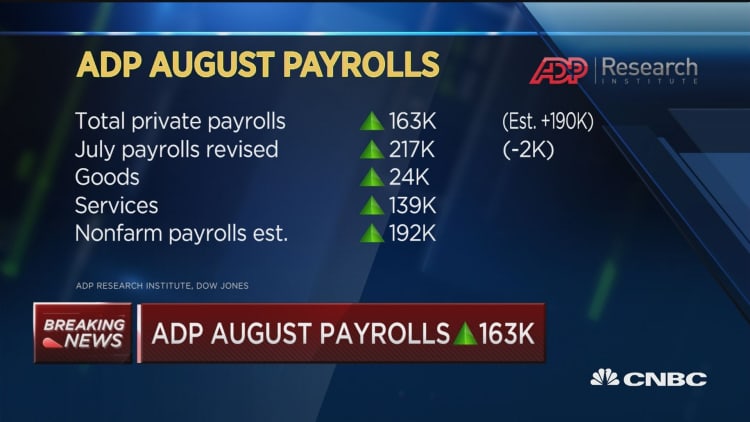Amidst strong economic growth and record-low unemployment, more Americans are quitting their jobs, confident they can land a new one with a fatter paycheck. This is especially good news for millennials, since job switching gives them the greatest opportunity to pump up their pay.
According to the latest numbers from the Labor Department's Job Openings and Labor Turnover Survey — or JOLTS — 3.4 million Americans quit their jobs in June. To put that in perspective, consider that the figure hasn't been that high since early 2001 and that it's double the 1.7 million folks who were laid off in the same month. Economists say the continuing strength of the economy and low unemployment numbers are making workers feel strongly that if they leave one job, they can quickly find another.
"The high rate of workers voluntarily quitting their job is actually a healthy indicator," said Andrew Chamberlain, chief economist for jobs site Glassdoor. "It's a powerful signal that workers are feeling bullish about the economy today."
Opportunity in a tight job market
By most accounts, they have every reason to be optimistic. Monthly job growth has averaged 215,000 for the first half of this year, and the stock market reached a new high in late August, with the Dow up 19 percent over the past year. The unemployment rate for the month held near a generational low of 3.9 percent, according to a Bureau of Labor Statistics report Friday.
The flip side of this coin is, of course, wages. Wage growth has been sluggish throughout the economic expansion, struggling to break 3 percent despite the tight labor market. Today's labor report was the first sign that trend may finally have bottomed out and be on the upswing. It revealed that average hourly earnings rose 2.9 percent for August on an annualized basis, a post-recession high.
To see bigger pay increases, workers are increasingly moving from one job to another. The trend isn't limited to just a few industries. Food service, construction and retail, to name a few, are all feeling the effects of job-switching. And in the tech industry, where the war for talent is particularly fierce, companies like SAP and IBM are having to redouble their efforts in training and personal development to keep employees from looking elsewhere.
According to the most recent analysis of wage data from the Federal Reserve Bank of Atlanta, people who switched jobs saw their wages rise nearly 4 percent vs. 3 percent for workers who stayed in the same job.
The high rate of workers voluntarily quitting their job is actually a healthy indicator. It's a powerful signal that workers are feeling bullish about the economy today.Andrew Chamberlainchief economist, Glassdoor
One point to keep in mind with these numbers, cautioned John Robertson, a senior policy advisor in the Atlanta Fed's research department, is that the folks looking for new jobs are typically younger and therefore paid less than people who are staying put. The U.S. Census Bureau (an agency that itself is having trouble finding enough workers) reports that about 6.5 percent of employees under the age of 35 changed jobs last year versus 3.1 percent of those ages 35 to 54.
"Younger workers are more apt to switch jobs or pick up and move across the country for a new job, because they're earlier on in their career," said Chamberlain. "They have fewer financial obligations that would keep them tied to their current job."
What's driving the trend
It's not difficult to understand why workers are moving around more. In an atmosphere where companies can't find enough of the talent they need, job hoppers are in the driver's seat. The opportunity to land a bigger title, learn new skills and make more money is significantly easier in a tight labor market.
What's also changing is the stigma of job hopping. Employers no longer view a robust résumé as a sign of instability or lack of loyalty. Instead, said Chamberlain, it's "a signal that a worker can learn, adapt and is invested in growing and developing their skills throughout their career."
Paige Warsak, 23, graduated from the Fashion Institute of Technology in New York City in May 2017 and quickly landed a job as a sales assistant with fashion company Elie Tahari. There she handled the company's boutique accounts and worked with the warehouse to make sure orders went out on time. As the war for talent started heating up in her field, Warsak began looking around and interviewed in May with another fashion house, Anne Klein.

The company offered her a job with the same title and essentially the same responsibilities but boosted her annual salary by 25 percent. "If I really want to make significantly more money, I knew I had to switch jobs," she said. And like many of her friends, Warsak was confident that finding a new position in this economy was not going to be difficult. "I wanted to get a year under my belt, but after that I knew I could find something that paid better," she added.
More from At Work:
AT&T's $1 billion gambit: Retraining half its workforce
Older job seekers watch out for age discrimination red flags
But while younger workers like Warsak can job-hop to catapult their salaries, the overall impact on wages from the tight labor market is far from robust for older and more experienced workers. "We're seeing a much more subdued pickup in wage growth, because a lot of the power has shifted from workers to companies," said Michael Pierce, senior U.S. economist at Capital Economics. With technology making it easier for firms to automate a greater number of tasks and the option of cheaper offshore manufacturing, the need to raise wages is muted.
The good news for workers, he believes, is that the war for talent is forcing companies like AT&T and SAP to invest more money in skills training for existing workers. Pierce said small businesses, in particular, are telling him that it is harder for them to find qualified workers than at any other time going back to the 1980s and that training is part of the solution. Giving workers new skills, he said, will ultimately make them more productive and therefore more valuable to their employers. "With better skills, employees can bargain for higher wages," he said.
Pros and cons of job-hopping
Yes, the labor market is tight and switching jobs in this environment can land you a fatter paycheck. But it's important to keep in mind that a résumé filled with short-term gigs can still be a turnoff for some employers. Keep these pros and cons in mind before you accept that next offer.
Pros
- You'll get exposure to new people and new ways of approaching projects and problems.
- Chances are good that a move to a new company will give you greater responsibilities and more opportunity to prove your skills.
- More money. This is among the top reasons why folks job-hop. A move to a new company can catapult your pay faster than annual raises at your current employer.
Cons
- Even with a tight labor market, companies still value loyalty. Staying in a job for just a year or two can make employers hesitant to hire and invest in you.
- If the economy tumbles and job cuts are on the table, you're more likely to be among the first to be let go.
- Every company goes through a tough cycle. If an employer thinks you're likely to bail at the first sign of trouble, they might be less likely to offer you the job in the first place.






